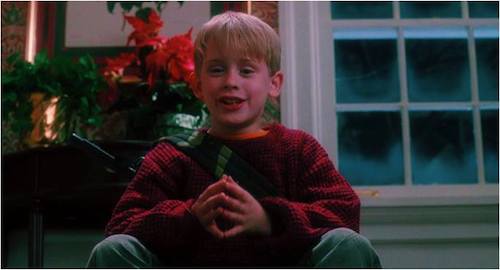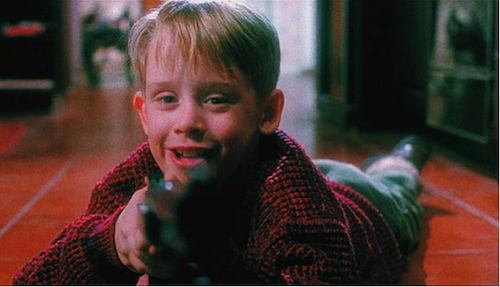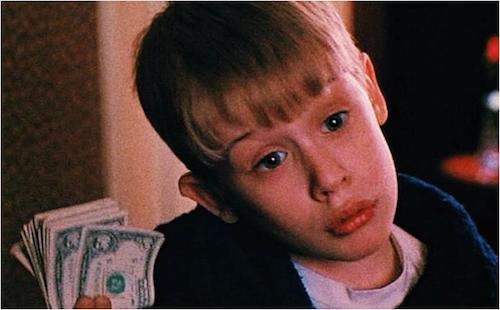Essays Shaun Scott — December 22, 2015 11:38 — 0 Comments
All Millennials are Kevin McCallister
The following is an excerpt from Shaun Scott’s e-book “Something Better: Millennials and Late Capitalism at the Movies,†available on Amazon and iTunes from Thought Catalog Books.
This holiday season marks the 25-year anniversary since the release of Home Alone. Millions of Millennials may grow nostalgic for the memories the movie evokes. Because no matter what became of Macaulay Culkin, Millennials will always see a part of themselves in Kevin McCallister.
Home Alone begins when members of a giant extended family in Chicago take turns demeaning young Kevin McCallister. In the film’s breathless opening sequence, Kevin McCallister has his culinary preferences ignored. Kevin McCallister is verbally and physically assaulted. And Kevin McCallister is made to sleep next to a cousin who promises to urinate on him come nightfall. When his mom delivers a final insult, Kevin McCallister proclaims he never wants to see his family again. Who can blame him? The next morning, he gets his wish: his family rushes out the door to catch a plane, and they forget Kevin in his bed. In the era where always-at-work parents led pundits to apply the term “latchkey children†to the kids they left at home, Home Alone soon turns into a metaphor for late capitalism’s expectations of Millennials.
Home Alone was released in 1990, just as a new “greed is good†social order forced parents to labor longer hours for lower wages. Gone were the comparatively equitable days of fair wages and redistributed tax revenues that defined mid-century Keynesian capitalism from 1945 until 1973. Ronald Reagan’s election in 1980 had instituted a Winner Take All Society, where wealth trickled upwards to an unfairly fortunate few. As Megan Erickson has written in Class War: The Privatization of Childhood, the decade leading up to the release of Home Alone was a time when “society became economically stratified and surges in GDP began to benefit an increasingly smaller percentage of high-income familiesâ€; a time when Lifestyles of the Rich and Famous took viewers into wealthy households well before MTV Cribs, and Michael J. Fox’s was running amok as a neoliberal spokesperson on the sitcom Family Ties. The McCallister’s home at 619 Lincoln Boulevard is a mansion, and Kevin’s parents admit that they’re overworking themselves to take care of it. In the world of Home Alone, a house this size is a visual signifier of success. Copious wealth is the film’s silent character; Kevin McCallister the young Millennial is enlisted to protect it, while robbers do their best to rob it.
What happens in the 3 days where Kevin McCallister’s parents are gone is remarkable. In a character mold crafted by John Hughes (of Ferris Bueller’s Day Off fame), Kevin starts off as a typical Generation X slacker who revels in irresponsibility and over-consumption. But he gradually emerges as a self-reliant Millennial whose technological ingenuity and paramilitary discipline save the family house from a pair of bungling burglars. Kevin McCallister realizes his potential with the help of three institutions that are critical to late capitalism: the market, the church, and the military.
While pondering options for groceries and entertainment, Kevin grows from a recalcitrant youth to a responsible young adult. The store’s endless options don’t addle his prepubescent brain with anxiety, but turn him into a savvy homo economicus. Home Alone uses a memorable bit of physical humor to credentialize McCallister’s burgeoning adulthood: the plastic bags Kevin carries home burst under the weight of the groceries, inviting adults who have invariably been in that exact situation to chuckle in self-recognition. Kevin went into the supermarket a boy, and consumer capitalism turns him into a little man.
Later in the film, Kevin McCallister’s status as a generational savior is foreshadowed when he hides from his tormentors by pretending to be a statue in a nativity scene. And it’s here that we see the film’s message for Millennials expressed most succinctly: the system’s survival depends on Millennials shilling for a status quo that depends on their (often as not unpaid) labor.
As Millennials, we grew up playing video games and watching action films that were funded by the federal defense establishment. Movies like Top Gun and Rambo were designed specifically to inculcate the next generation of soldiers—the directors of those movies were given valuable access to military equipment and facilities by the Pentagon in exchange for favorably framing the armed forces for young viewers. And Ronald Reagan famously said that “the soldiers of tomorrow†were prepared by video games like Contra and Space Invaders. So when an 8-year-old Kevin vehemently proclaims “This is my house, I have to defend it!â€, we’re witnessing the triumph of a military-industrial-complex whose greatest asset was the Millennial mind.
With the market, the church, and the military figuring as prominently in the film’s narrative as they do, Home Alone is a bizarro reflection of the United States. Widespread faith in an unfettered free market was bolstered by appealing to Christian narratives of “self-reliance. Meanwhile, the inequalities resulting from this system creates (the illusion of) more borders to police, spaces to surveil, and private property to protect. Anxieties over crime and the purported decline of traditional religious values mask the fact that over-worked parents were victims of their own symbols of success. Their private lives fell prey to hypocritical politicians who decried the “demise of the family†while simultaneously giving those families fewer resources to succeed. And after Baby Boomers voted in a “Reagan Revolution†that sacked social protections and gave the economy over to Wall Street robber barons, Millennials are charged with the task of repairing the considerable damage these events have done to the American social contract. Like Kevin McCallister and his MacGuyver-like proficiency with booby-traps, many of us are being asked to do more and more with less and less.
In a parallel universe, Kevin McCallister got drafted into the military after 9/11. He perished in Afghanistan as a victim of friendly fire in an unjust war. That mansion he protected in 1990? Foreclosed during The Great Recession. Bank of America owns it now. That’s what happens to “heroes†who put the needs of others first. But our generational saint died so we wouldn’t have to follow in his footsteps.
When our time comes, the home we defend will be our own. It’ll be the house or condo or pimped-out container in the middle of nowhere we’ll buy when we finally pay off these student loans; when we move out of the basement; when our significant other finally gets with the program and realizes that the future we could share is worth fighting for. Until that day, keep Kevin McCallister in mind: trudging through the previous generation’s house with a BB gun, waiting to shame those thieves in the night into total submission.
“This is it,†he declares defiantly. “Don’t get scared now.â€
The answer isn't poetry, but rather language
- Richard Kenney







